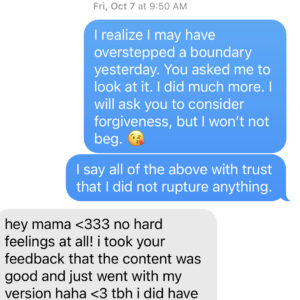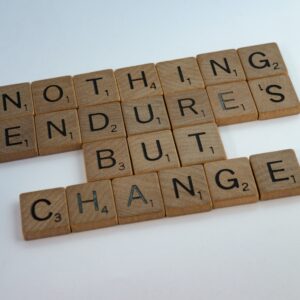“And these children that you spit on.
As they try to change their worlds.
Are immune to your consultations.
They’re quite aware of what they’re going through.”
I am not suggesting that you or we are spitting on our children. But. Yeah. David knew a thing or two.
Are we aware? Quinn bought and read a great book when our kids were embarking on adult life, “Designing Your Life”. I think that she bought one for each of the kids. No idea if they cracked it open, and she suggested that I read it and…yeah…
Our children’s growing up taught me many things. One is that it is never too late to redesign my life. Never. Neuro plasticity is absolutely a thing. There are about three trillion podcasts reassuring us that yes, even grown ups can still change. So, “Is it too late?” parents ask us. It’s never too late.
One of the many other things that our kids taught me is that the only life I can design is my own. I raised them, I had hopes and dreams and imagined them grown, but they are not living those lives, they are designing their own, and what a wonder it is to behold!
I learned to let go and leave the kids alone. And I succeed…most days. Don‘t ask our older child about the letter they shared with me to read a few weeks ago…that I edited and rewrote and sent back…and texted the next morning:

Now, about that design business.
We humans are all designed to create life from a mere two cells. That’s an impressive design. In general women’s bodies are designed to grow humans. If any of those design systems do not function as expected and a couple cannot conceive, a woman cannot breastfeed, etc. humans can feel like failures. No human is a failure. Science and psychology have eased some of that trauma and pain for wanting-to-be-parents, and new parents as well.
Next, after forming that human within our bodies, the design calls for our bodies to push that design inside out of our bodies after forty weeks, give or take. Crazy design, but it works. Again, most of the time, sometimes other exit plans are revealed, hello c-sections.
Once out in the air those infants are designed to be little survival machines-and we are designed to respond and help them survive. They let us know if we don’t feed them, change them, pay attention to them, help them learn how to go to sleep and on and on and on and…. They are dependent upon an adult for their survival and well-being.
Whether you birth, adopt or become a stepparent- you can prepare for parenthood, but really? After speaking with thousands of new moms in my pre-Plan P life, there is nothing that can truly prepare you for that life changing experience of adding a child to your home. You can design a nursery. You can read books, listen to podcasts, watch YouTube, take classes, join new mom groups and platforms. And most parents still find some things challenging when their baby comes home.
Quinn became a stepparent when our kids were eight and eleven and often expressed how she was not prepared for that life transition of becoming a parent. As parents we learn. We learn that patience does pay off and screaming and crying do not. The kids eventually adapt to us, and to the world, and we adapt to, and adore, having them in ours. Humans are designed to adapt to change.
Adolescence: The Next Transition!
The transition to becoming the parent of an adolescent is very similar and very different from that earlier transition to parenthood. Those children of ours are designed to do what we did-to go out into the world and live their own lives. Most parents do not prepare for this departure with the same excitement that we did for their arrival into our homes.
Most parents of ten-year-olds are not reading, watching, listening or taking classes on how to be a parent to an emerging adult aka a teen. There are no waiting lists for that Parenting Teens Education Night. The kids seem to be alright; they’re growing up, they may even appear to be adults! At those education nights, all those previously excited new parents are now just scared.
We forget that teens are designed to take risks. Literally. I knew this. I went to the nights, I listened and even read a few books, and I forgot. It can be a very challenging time- for parents. Our children are designed to need us, and then to build their own lives, separate from us.
By design, based on the stage of their brain development, teens are more likely to behave in ways which terrify their parents. This does not mean that they are total and complete idiots. They are not. They are developing.
They are designed to grow and absorb information and learn from their mistakes. They can have entirely reasonable conversations with reasonable adults. Ours had many of these- and even had some with us. One of our smart beloved children once pointed out that Bill Clinton may not have inhaled, but he was at a party where he could have; that George Bush got a DUI; and that Barack Obama snorted cocaine- and all of those men seemed to do alright for themselves, so, what was I worried about? I hated the teen brain at that moment.
We are afraid to let them make mistakes. We don’t trust them to learn. I know that I lost that memo at some point. I had no idea what to do.
As parents, if we expect them to behave in a manner inappropriate given their brain development, that is like saying to an infant “Okay, time to go to sleep.” and expecting them to comply. As a trained Infant and Toddler Sleep Consultant I remind parents that our job is not to train our children (although many people refer to it as sleep training), but to help them learn that they can do it for themselves. Often in learning to do it they resist-sometimes for hours, they cry- sometimes for hours. It’s hard on us, and it’s clearly not fun and games for them, but they do learn, and they do sleep.
Some teens will be very vocal when you set boundaries. They will resist when you tell them that you know they can do it for themselves. They can scream louder now, and they can form full sentences and make threats. There is not, to my knowledge, a book on teen sleep training. They don’t care about Matthew Walker’s best selling book on the subject, Why We Sleep, which examines why sleep matters to them and to all of us. And we can’t make them care.
In helping an infant or toddler learn to get themselves to sleep, as in helping a teen learn to adult, the important thing is that we parents believe that they can succeed- even when we are exhausted, tired and at our wit’s end.
Knowing what we know about the teen brain, it makes total and complete sense that we parents want to protect our beloved children. But they weren’t designed for that. Our job is not to save them. We cannot save them. That is a terrifying statement, but it is true. What we can do is build relationships with them. We can be there for them, which means different things at different stages of development. Refer back to Bowie as needed-they can do a lot for themselves, we just need to let them feel the success of doing it for themselves. We get to be there, not directing, only consulting when asked.
We can let them learn from their mistakes and be there for them when they fall. Our best bet is to not anticipate the fall but to be there if they fall and then ask for a hand to help them up. If they don’t ask, don’t go running onto the playground to save them. How much and how depends upon their age and stage; pre-teen, teen or young adult, and what kind of relationship we have built with them to date.
To that end, how’s your brain development going? Are you living your life? Are you working on your neuro plasticity? Are you practicing mindfulness and meditation as is strongly recommended for a healthy, thriving (and aging) brain? Playing brain games? Learning a new skill? How much sleep did you get last night? Are you having a life of your own?
We have the most amazing kids. We get to see them pretty frequently, except when we don’t, because adult lives are busy lives. They call when they hit bumps “I’m okay, but…” and they call just to say, “I miss you let’s do dinner.”
The truth is, despite my missteps, our children know that we love them, they actually always did, so do yours. Trust that.







